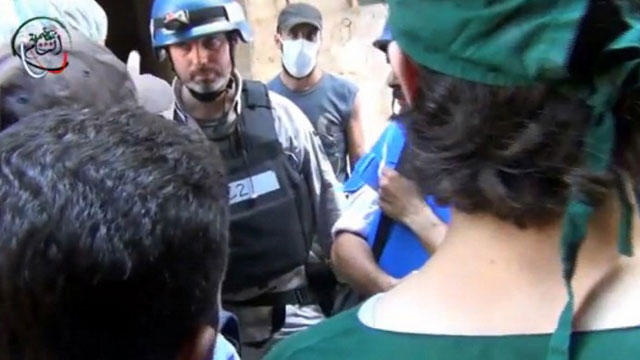SUMMARY
This is AI generated summarization, which may have errors. For context, always refer to the full article.

THE HAGUE, Netherlands – The world’s chemical weapons watchdog met Friday, November 15, to approve a final timetable for destroying Syria’s arsenal by mid-2014, amid hopes that long-delayed peace talks could be held soon.
Friday is the deadline for the Organization for the Prohibition of Chemical Weapons (OPCW) to agree “destruction milestones” for the more than 1,000 tons of dangerous chemicals in Syria, according to the terms of a US-Russian deal that headed off US military strikes on President Bashar al-Assad’s regime.
Talks between the 41 members of the Executive Council at headquarters in The Hague were adjourned until 1630 GMT, OPCW spokesman Christian Chartier said.
Delegates were “still talking about the text of the decision,” a diplomatic source told Agence France-Presse.
Contentious points remain
Despite general agreement by the international community on helping Syria get rid of its chemical weapons, contentious points remain. They include the supply of so-called “dual purpose” equipment to help with the transport of the chemicals, and where they will be taken to for destruction.
Albania is considering a US request to allow the weapons to be destroyed there, with Prime Minister Edi Rama saying he would make an announcement on the matter at 1600 GMT on Friday.
The Balkan nation destroyed all its own chemical weapons left over from the Communist era, but many Albanians have been protesting against Syria’s chemicals going there.
With the fractured Syrian opposition suffering a string of recent setbacks, including five rebel commanders killed since Thursday, reports said a long-delayed peace conference could be held in Geneva on December 12.
The international community has been trying for months to convene a peace conference dubbed “Geneva II”. But proposed dates have come and gone with no progress.
The regime has said it is willing to attend, provided Assad’s departure is not on the table. The opposition, though, insists on Assad’s departure and exclusion from the transition process.
Assad discussed the talks in a phone call with Russian President Vladimir Putin on Thursday, the Kremlin said, with a high-level Damascus team due in Moscow next week to finalise details of the Geneva conference.
A team of UN-OPCW inspectors has been on the ground since October checking Syria’s weapons and facilities.
Destruction of declared chemical weapons production facilities was completed last month and all chemicals and precursors placed under seal, the OPCW said last month ahead of a November 1 deadline backed by a UN Security Council resolution.
There is consensus that the chemicals are best destroyed out of the country, which is wracked by a conflict that has killed more than 120,000 people according to the Syrian Observatory for Human Rights.
The United Nations says the more than 2-and-a-half year uprising against Assad’s regime has also forced millions to flee their homes.
OPCW head Ahmet Uzumcu wrote to the Syria disarmament special coordinator Sigrid Kaag on November 11 laying out a tentative plan for the destruction, a diplomatic source told Agence France-Presse.
Under the plan, resources for packaging and handling the chemical materials would be sent to 12 chemical storage sites by December 13, the source said, after which the chemicals would be taken to Latakia, Syria’s main port on the Mediterranean, and shipped out by February 5.
Syrians requested equipment
The Syrians have requested equipment to help the process, including armoured 4×4 vehicles and electronic counter measure (ECM) equipment.
Western nations refuse to supply them as they could be used against rebels. Syria’s ally Russia could, however, supply such dual-purpose equipment.
Norway and Denmark have already said they would provide ships to take the chemicals out of Syria, with Denmark saying it would also provide a personal protection team for international inspectors.
France and Belgium are also believed to have been asked for possible help by Washington.
The joint Russian-US Syrian chemical weapons disarmament plan was endorsed by the UN Security Council in September to head off military strikes in retaliation for the regime’s alleged use of the weapons against its own people after a chemical attack against a Damascus suburb in August left hundreds dead. – Rappler.com
Add a comment
How does this make you feel?
There are no comments yet. Add your comment to start the conversation.